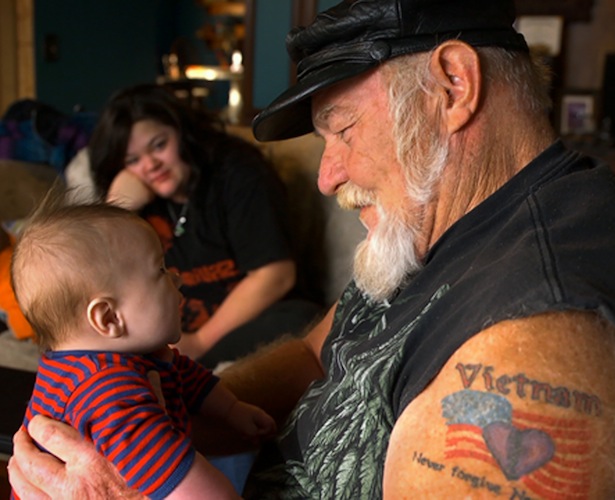Film Review: “Stray Dog”—A Red Neck Hero
Stray Dog shows us again and again, through its protagonist’s words and actions, that you can’t judge a book by its cover, or its red neck.
Stray Dog, directed by Debra Granik. Screening at the Brattle Theatre, Cambridge, MA, October 23 through 25.

A scene from the documentary “Stray Dog,” a portrait of Ron “Stray Dog” Hall: biker, Vietnam vet, and lover of small dogs and children.
By Betsy Sherman
Ronnie “Stray Dog” Hall doesn’t agree with the patches worn by some of his fellow Vietnam veterans that read, “If You Ain’t Been There, ppl Shut the Fuck Up.” Still climbing out of the dark place in which his post-traumatic stress disorder put him, Hall goes out of his way to help fellow vets and their families. But he carries the same generous spirit into his dealings with non-vets. If the subject of his war experience comes up among civilians, he’s candid and considerate, especially if the exchange could lead to empathy with other war vets that the listener might meet down the road.
Cambridge native Debra Granik has made Hall the subject of her documentary follow-up to the Ozarks-set indie hit Winter’s Bone (in which Jennifer Lawrence played a teen navigating strife among her extended family). The man whose nickname gives the film its title is a comfortably hefty-and-hairy biker who runs the At-Ease RV Park in Branson, Missouri.
With a fly-on-the-wall style that means no explanatory voice-over or talking to the camera, Stray Dog shows how this gentleman faces challenges head-on during a period in which his family circumstances change. One challenge is learning Spanish, to better communicate with his relatively new wife Alicia (a Mexican who speaks English) and her twin sons (who speak little English). Another is to deal with the nightmares during which he flashes back to the war, reliving not only atrocities visited on himself and the men close to him, but also those he committed (we hear about some of this during a session with his shrink, who’s also a biker).
Ronnie and his buddies are flag-bearers at local funerals of veterans of our more recent wars. The documentary’s big set-piece is the bikers’ ride to the Vietnam Veterans Memorial in Washington, D.C. Alicia, who urges the reluctant Ronnie to do things like wear sunscreen, takes her place on the back of his motorcycle. Other movies would use this journey, and its emotional endpoint at the wall of names, as a big finish. This one, to Granik’s credit, places it at about the halfway point, and is more interested in Hall’s personal interactions. It digs beneath familiar platitudes about family, faith, and country.
Stray Dog shows us again and again, through Hall’s words and actions, that you can’t judge a book by its cover, or its red neck. Ironically, the typical documentary viewer will identify most with Alicia’s 19-year-old boys Jesus and Angel, who during the second half of the film move from bustling Mexico City to a trailer in Hicksville, USA. Looking shell-shocked, they ask their mother how she got used to this place, and this husband. Love, she says simply. When you love, you can adapt.
The strictly observational format means that many questions (such as how Ronnie and Alicia met) will remain unanswered. The film does tend to minimize any flaws its subject has, or at least relegate them to his younger days (when, he says, he paid thousands of dollars in fines for assault charges). But it does earn the adjective ‘inspirational,’ centering as it does on a man who every day accepts that he’s a work-in-progress, and showing by example that that’s a perfectly fine thing to be.
Betsy Sherman has written about movies, old and new, for The Boston Globe, The Boston Phoenix, and The Improper Bostonian, among others. She holds a degree in archives management from Simmons Graduate School of Library and Information Science. When she grows up, she wants to be Barbara Stanwyck.
Tagged: Debra Granik, documentary, IFFB, Independent Film Festival Boston, Ronnie “Stray Dog” Hall, Stray Dog, Vietnam Veterans
